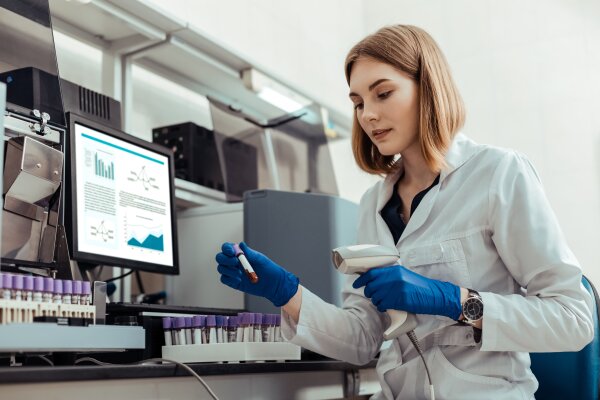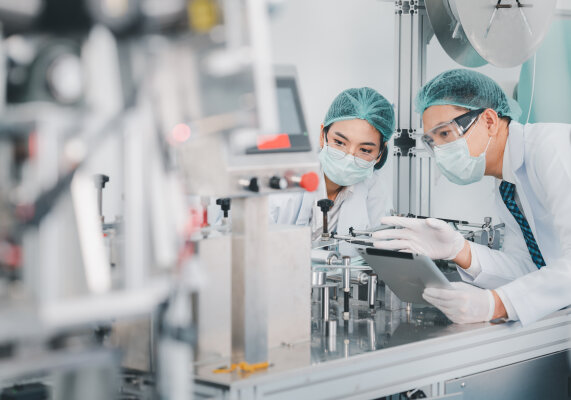The smart lab in life science and healthcare - groundbreaking developments

In the field of research, diagnostics and, not least, quality management in a wide range of industries, the so-called "smart lab" plays an important role. In the age of digitalization, laboratories face numerous obligations and challenges. The goal was and still is to ensure higher automation as well as sustainably improved data integrity.
Furthermore, the aim is to achieve greater transparency and better usability with regard to the technologies and structures used. Over the past five years, a lot has happened in these areas, and significant changes are on the horizon for the future. We would like to illustrate here what the smart lab is already capable of achieving, what advantages result from it and what requirements will have to be met in the coming years.
The smart lab is constantly evolving
As advanced as the multi-layered cosmos of research and science is, it is interesting to observe that even in modern laboratories, processes and technologies are sometimes not or only insufficiently interconnected. Even the samples used in tests and experiments are often still processed manually by the experts responsible. However, it is also a fact that modern laboratories are increasingly able to generate ever larger amounts of data and to make specific processes more time-, cost- and resource-efficient overall.
Today, more and more excellently thought-out automation solutions are being used, but they cannot yet be fully utilized or exploited in all laboratories. One of the reasons for this is the sometimes very stringent legislation and regulations. Worth mentioning in this context are the sometimes non-standardized processes in everyday laboratory work. Certainly, the cost of establishing new technologies is quite high in some areas. At the same time, it is felt that certain processes can apparently be handled more easily and flexibly manually than is the case with automated platforms and equipment. Really?
Our experts take a closer look
One trend in particular is emerging: many laboratories are literally advancing to become networked data institutions. And this is happening against the backdrop of generating information that is invaluable in terms of goal-oriented corporate management. In addition, sustainable, modular solutions for hardware and software systems can be designed and individually aligned.
Progress in process monitoring and documentation
The interaction between man and machine plays an essential role in the Smart Lab. In order to achieve optimum results here, particular importance is attached to the tracking of materials. The aim is to create a meaningful platform for those responsible in the laboratories to make the handling and monitoring of valuable samples and specimens even more efficient. Instead of relying on the classic handwritten lab book - as was the case some five to 10 years ago - the focus is instead shifting to centralized information and documentation interfaces. In this way, laboratory staff can more easily and directly secure both personal and need-based information for selected specialist areas.
In this context, the virtualization of selected laboratory processes is also increasingly being discussed. With regard to the ordering of samples, cells, cell structures and the like, the targeted use of technology should enable people to benefit from a more uncomplicated, faster and, above all, cost-effective transfer of the required values and data.
Intelligently interconnected - with modern solutions from MedSolut.com
Humans and machines will cooperate more and more with each other in the laboratory of the future, saving valuable time in the transfer and evaluation of data. Keyword: automation in research and science - the workload of manual labor should be reduced and thus creative and effective solutions to problems can be found. An elementary feature of the Smart Lab "of tomorrow" is the targeted and structured collection of data, automated calculation and analysis with the help of selected software solutions, and centralized storage on a digital level.
Instead of the aforementioned "classic", the manually written laboratory notebook, a laboratory, information and management system will be used that will grant individual access to selected employees. This will enable all data and analysis values to be used and processed in a value-adding and sustainable manner and to be used widely as required.
Automate and digitize equipment
Essential devices and technologies used in the Smart Lab will be highly automated and miniaturized within the next five years at the latest. The aim is to achieve full data linkage between all devices. This will simplify device operation and make data exchange more efficient. At the same time, both vertical and horizontal communication structures are already being established:
- vertical communication
The vertical communication level refers to the connection between user, device and server infrastructure.
- horizontal communication
Horizontal communication refers to the device sequence in the respective work procedure. In this respect, a distinction is made between the physical and virtual structure.
Our friendly specialists will be glad to show you the advantages as well as the novel technologies and systems of the Smart Lab. We will support you in planning and organizing as well as in implementing or providing and selecting the required system and technology solutions. Incidentally, the implementation of specific, needs-based infrastructures, security technologies and the like should be initiated as early as possible in order to define clear lines for future applications.
All in all, it will already be possible to achieve quantifiable business benefits in the laboratory of the future in the foreseeable future. Accordingly, you can already expect to benefit from sustainable institute scalability in your lab or institute.
Do you have any questions about Smart Lab? We look forward to hearing from you and are always available to help.




